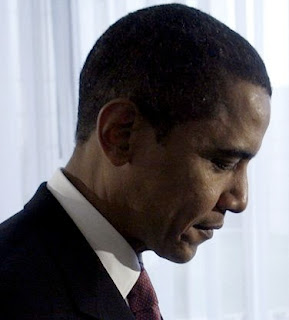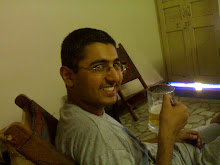Triumph of the Intangible

Hope and dreams are two much abused words. Overused, oversold and perhaps exaggerated on occasions. They have this intangible quality to them that makes the hard nosed realists amongst us to treat them with their opposite feeling – cynicism. Both hope and dreams carry with them a cruel companion named reality that does not always allow them to reach their intended junctions. But hope is a foundation for action and dreams a foundation for ambitions. They are the first tentative, hazy steps in a journey called realization.
Barack Obama reached one stage of that journey today as he became the first African American to claim the Presidency, an attainment that this author had certainly not thought possible for another two decades and many of his slightly more cynical friends, during their entire lifetimes. But Obama is now at the summit of political power – and he has been propelled there by the intangibles of hope, change and dreams that we often dismiss as being out of place characters in the political drama. Across the United States, Obama, a political greenhorn in terms of his Washington experience, has performed two actions that few politicians are able to achieve – transcend barriers of identity and make people believe that they have a stake. He is not a black President, for blacks could simply have not voted him into power. He has projected himself as the American president, consistently called for an end to the bitter divides between liberal and conservatives, white and black, Democrat and Republican. By acknowledging concerns on both sides of the debate he has brought a tone of moderation into his political language. He risked his credibility amongst blacks by calling for them for being more responsible as a community and as individuals, and also staked his white votes by reminding them that the animosity of racial discrimination still haunted the poorest of America’s communities. He has won by talking to the people and not at them. Credit it to his rhetoric, ideas or just youthful energy but he has made young Americans believe that they can change the way the nation is governed by casting their ballots. It’s no surprise that his win has come on the back of large voter turnout and that many first time voters went with him. Young men and women are more perceptive to the happenings around them, more aware of their surroundings and across the world more and more cynical about their political systems and the vested interests that govern them. Obama has made them believe in the political process and that is an achievement in itself.
But make no mistakes; this is not a rout as the Electoral College vote will tell you. Obama has won a 52-47 popular vote mandate, which still reflects a nation with two halfs at odds with each other. In his book ‘The Audacity of Hope’, Obama talks of how President Bush was emboldened and gung ho after a 51-49 victory over John Kerry in 2004 and how the White House had forgotten that there was a section of America that hadn’t voted for it. In his acceptance speech, Obama talked of being a President also for those whose support he had not won; of listening to his people, particularly when they disagreed with him. He would need to live up to his word, for in a Washington now set to be ruled by Democrats, a humble and gracious President would need to engage in dialogue to overcome the bipartisanship that he mentions as disturbing in his experiences. Obama, the author, critiques how ‘we paint our faces blue and red and cheer our side and boo the other; and if takes a cheap shot or a late hit to win the game then so be it, for it seems that winning is all that matters.’ An Obama presidency will need to avoid the same pitfalls.
It would not be wrong to say that in this moment America needed an Obama as president more than he needed the seat himself; simply because of the message it sends to the world. I am not a romantic and don’t think that America’s problems will be solved in his tenure but Obama’s election signals a shift of view point in America. It signals a break from old prejudices, from hidden biases of the ‘Bradley Effect’, from the Guns, God and Gays rhetoric of the neo-right. But more importantly it symbolizes an electorate willing to choose ability over identity – the very principle of foundation of the American nation. And as the demography of the United States increasingly yields more space to the non-whites, a new generation will hopefully not be entrapped by their limited visions and dare to look beyond.
But is Obama a socialist and an uncomfortable President for India? If he succumbs to the protectionist and non-proliferation lobbies of the Democrats, then maybe but so far he has demonstrated to be his own man. In his book Obama devotes a chapter to ‘Opportunity’ and opines on big government and globalization. He mentions how ‘the conservative revolution that Ronald Reagan helped usher in gained traction because Reagan’s central insight – that the liberal welfare state had grown complacent and overly bureaucratic with Democrats more concerned with slicing the economic pie than enlarging it – contained a good deal of truth.’
He further states that ‘America can’t compete with China and India simply by cutting costs and shrinking government - unless we are willing to tolerate a drastic decline in our living standards. Nor can America compete by simply erecting trade barriers and raising minimum wage - unless we are willing to confiscate all the computers of the world. We don’t have to choose between an oppressive, government run economy and a chaotic and unforgiving capitalism. Like those who came before us, we should be asking what mix of policies will lead to dynamic free market, widespread economic security, entrepreneurial innovation and upward mobility…. Let us begin with those investments that can make America more competitive in the global economy – in education, science, technology and energy independence.’
These to me are hardly the words of a socialist, much less a protectionist. Obama has displayed an understanding of Pakistan and its equation with India and Afghanistan. It will be up to South Block to appraise the latest US President of Indian concerns and apprehensions. The world’s largest democracy should be able to hold its own irrespective of any White House occupant. Will he be a friend of India? Given Obama’s respect for democracy, dialogue, tolerance and natural justice, I can stick my neck out and say a confident yes.
Barack Obama has talked about the need for a ‘deliberative democracy’, to understand ‘that we must talk and reach common understandings precisely because all of us are imperfect and can never act with the certainty that God is on our side; and yet at time we must act nonetheless, as if we are certain, protected from error only by providence.’
The world awaits Barack Obama…..Hope and Dreams wait in the shadows, packing their bags for a journey ahead.



